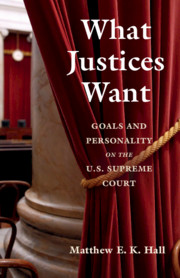Book contents
- Frontmatter
- Dedication
- Contents
- List of Figures
- List of Tables
- Acknowledgments
- 1 Who They Are and What They Want
- 2 Goals and Personality
- 3 Measuring Justice Personality
- 4 Agenda Setting
- 5 Opinion Assignments
- 6 Intra-Court Bargaining
- 7 Voting on the Merits
- 8 Separate Opinions
- 9 Behind the Black Robes
- Appendix A Agenda-Setting Analysis
- Appendix B Opinion Assignment Analysis
- Appendix C Intra-Court Bargaining Analysis
- Appendix D Voting on the Merits Analysis
- Appendix E Separate Opinion Analysis
- Notes
- Index
7 - Voting on the Merits
Published online by Cambridge University Press: 22 August 2018
- Frontmatter
- Dedication
- Contents
- List of Figures
- List of Tables
- Acknowledgments
- 1 Who They Are and What They Want
- 2 Goals and Personality
- 3 Measuring Justice Personality
- 4 Agenda Setting
- 5 Opinion Assignments
- 6 Intra-Court Bargaining
- 7 Voting on the Merits
- 8 Separate Opinions
- 9 Behind the Black Robes
- Appendix A Agenda-Setting Analysis
- Appendix B Opinion Assignment Analysis
- Appendix C Intra-Court Bargaining Analysis
- Appendix D Voting on the Merits Analysis
- Appendix E Separate Opinion Analysis
- Notes
- Index
Summary
On May 17, 1954, Chief Justice Earl Warren announced the Supreme Court's unanimous decision in Brown v. Board of Education, declaring that “in the field of public education, ‘separate but equal’ has no place.” According to some legal experts, the Court's unanimity in Brown was “[s]econd in importance only to what the Supreme Court decided” that day. For example, “[p]opular books and pamphlets supporting the [desegregation] decisions pointed to unanimity as evidence of the legitimacy of the rulings.” But unanimity in Brown was never a foregone conclusion. Just six months earlier, when the Court discussed the Brown case in conference, several justices still opposed a decision mandating desegregation. The clearest opposition came from Justice Stanley F. Reed, “who made it plain … that his views remained what they had been – against closing up Jim Crow schools.”
What happened in the months between the conference discussion and the announcement of the Court's opinion? Why did Justice Reed change his mind and join the majority? Surprisingly, the explanation most commonly offered by historians, biographers, and legal scholars has little to do with constitutional law or politics. Justice Reed did not experience an ideological transformation, nor was he convinced by a legal argument. Instead, the most prominent accounts of Reed's evolution in Brown suggest that Chief Justice Warren persuaded him to change his vote through a steady dialogue that included frequent lunches between the would-be dissenter, the chief justice, and Warren's ally, Justice Harold H. Burton. Eventually, Warren coaxed Reed into joining the majority by appealing to his sense of duty.
Justice Reed was a “conscientious, hard-working jurist, conservative by temperament and respectful of precedent.” He was known as an “incredibly methodical” and “prodigious worker, laboring often at night.” And Reed's “conscientious manner” also included a strong sense of duty. As Justice Felix Frankfurter once put it, “Reed was a soldier and glad to do anything that the interest of the Court might require.”
Never was Reed's devotion to the Court more important than in Brown. “Because he was a Southerner, even a lone dissent by him would give a lot of people a lot of grist for making trouble.”
- Type
- Chapter
- Information
- What Justices WantGoals and Personality on the U.S. Supreme Court, pp. 109 - 130Publisher: Cambridge University PressPrint publication year: 2018



